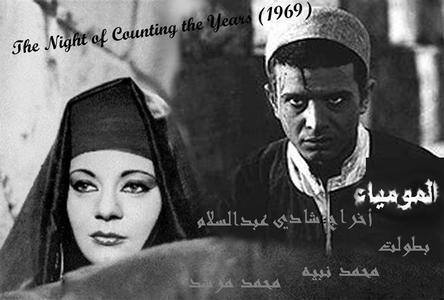 NADIA LUTFI, AHMAD MAREI IN A POSTER FOR THE MUMMY (N.B.: THIS IS A COLOR FILM)A restored Egyptian "masterpiece" ponders identity and moralityThe Mummy
NADIA LUTFI, AHMAD MAREI IN A POSTER FOR THE MUMMY (N.B.: THIS IS A COLOR FILM)A restored Egyptian "masterpiece" ponders identity and moralityThe Mummy or
The Night of Counting the Years, written and directed by Shadi (or Chadi) Abdel Salam (or Abdessalam, 1930–1986) is a generally handsome, if excessively self-important and ponderous, Egyptian historical film in classical Arabic that has recently been restored by the Cineteca of Bologna with support from Martin Scorsese's World Cinema Foundation. It was shown this year at the Cannes Festival as part of a new series called Cannes Classics, and carried over to the New York Film Festival. It features a brief appearance by well-known actress Nadia Lotfi. The cast also includes Ahmed Marei, Ahmad Hegazi, Zouzou Hamdy El-Hakim, Abdelazim Abdelhack, Abdelmonen Aboulfoutouh, Ahmad Anan, Gaby Karraz, Mohamed Khairi, Mohamed Morshed, Mohamed Nabih, and Shafik Noureddin.
The theme is one dealt with in other Egyptian films: the ambiguous relationship of Upper Egyptians, particularly the (three) centuries-old families of the village of Gourna, with their country's Pharaonic past; and, by vague implication, the question of modern Egyptian identity. Are the Gourna families the antiquities' custodians and guides, or are they mainly tomb robbers who live off the proceeds? This film, which has already had international recognition, stands out for its handsome actors, and for its sometimes striking cinematography, especially during the final climax, enhanced by the films's almost entirely being shot at dawn or dusk. The images of the final parade of horses and men robed in white and black carrying ancient treasure along a horizon glowing in the corpuscular haze and passing by the Colossi of Memnon are hard to forget.
The main character is Wannis (Ahmed Marei), who with his brother (Ahmad Hegazi) learns from their father, the family (or tribal) elder, the "secret" of the mountain: the location of a large cache of sarcophagi hidden there perhaps 3,000 years earlier to protect them from the tomb-robbers of that time. Wannis is troubled by this information, and eventually reveals the Horabat's secret to a young member of the Egyptian Antiquities Organization who has come up the Nile in a steamboat in the summer specifically to prevent tomb-robbing from taking place during the Egyptologists' off-season.
The slow-moving scenes don't always get their points across very clearly, but it is clear that the tribal elder gets killed by robbers while preparing to sell a valuable amulet. A bond develops between Wannis and a mysterious young Stranger (Mohamed Morshed) -- and perhaps with the young Antiquities official. The chief military guard on the steamboat, also young and handsome, resents and is perhaps jealous of Wannis' meeting privately with the official. There is almost a (subconscious?) homoerotic subtext here, with women only peripheral, and all these handsome, brooding, dark--skinned young men who share a mysterious bond.
There's a clearly implied conflict of values between the mountain people and the
effendiyya, the westernized, educated Cairenes. whom the young Antiquities official represents. The paradox is that some of the
effendiyya can read Egyptian hieroglyphics, while the Horabat, to justify their tomb-robbing, argue that nothing is known about the Pharaohs any more, that they are not related to any people, and hence their artifacts have no inheritors more logical than themselves. Wannis manages to take the amulet from the men who stole if from his murdered father, but then he's knocked unconscious. When he wakes up, he encounters the Stranger and decides to approach the steamboat and tell the Egyptologist his secret.
The result is the luminous sequence for which the film deserves to be remembered, in which the Egyptologist's men and others hired from the village spirit away the contents of the mountain cache at dawn, slipping by the Horabat, who choose not to attack them. The Egyptologist has found that the cache encompasses remains from not just one but four dynasties.
What is to happen to the Horabat, who like all the people of Gourna, have little livelihood other than from selling antiquities? An
Al Ahram Weekly article from 1998 shows that the same dilemmas persist even today -- their lack of other livelihood apart from the antiquities; their unwillingness to move (as when architect Hassan Fathi designed a village for them in the late 1940's, but they ultimately refused to inhabit it). A Horabat elder interviewed for the article denies the validity of this film: the idea that his people knew "nothing except a road up to the mountain" is just a filmmaker's whim. He also resents the idea that the Horobat were totally ignorant of Egyptology; in fact the uneducated Egyptians who have long lived on the edges of the ancient remains are wellsprings of lore about them and take pride in their skill as guides. This film, however impressive at times, is the stuff of myth and fantasy.
Sometimes it seems a shame that Europeans and Americans admire these overwrought, moody Egyptian "masterpieces" of he 1960's and tend to overlook the more polished popular films of the 1940's and 1950's "Golden Age" of Egyptian cinema that are more representative of the culture. This is especially true since it's the Egyptians whose lively 20th-century theater pioneered in a move toward the use of more realistic colloquial Arabic ("
'ammiyya") rather than the stilted, formal "
fusha" literary language that both ennobles and weigns down dramas like
The Mummy.
Shown as part of the main slate of the New York Film Festival at Lincoln Center 2009.





